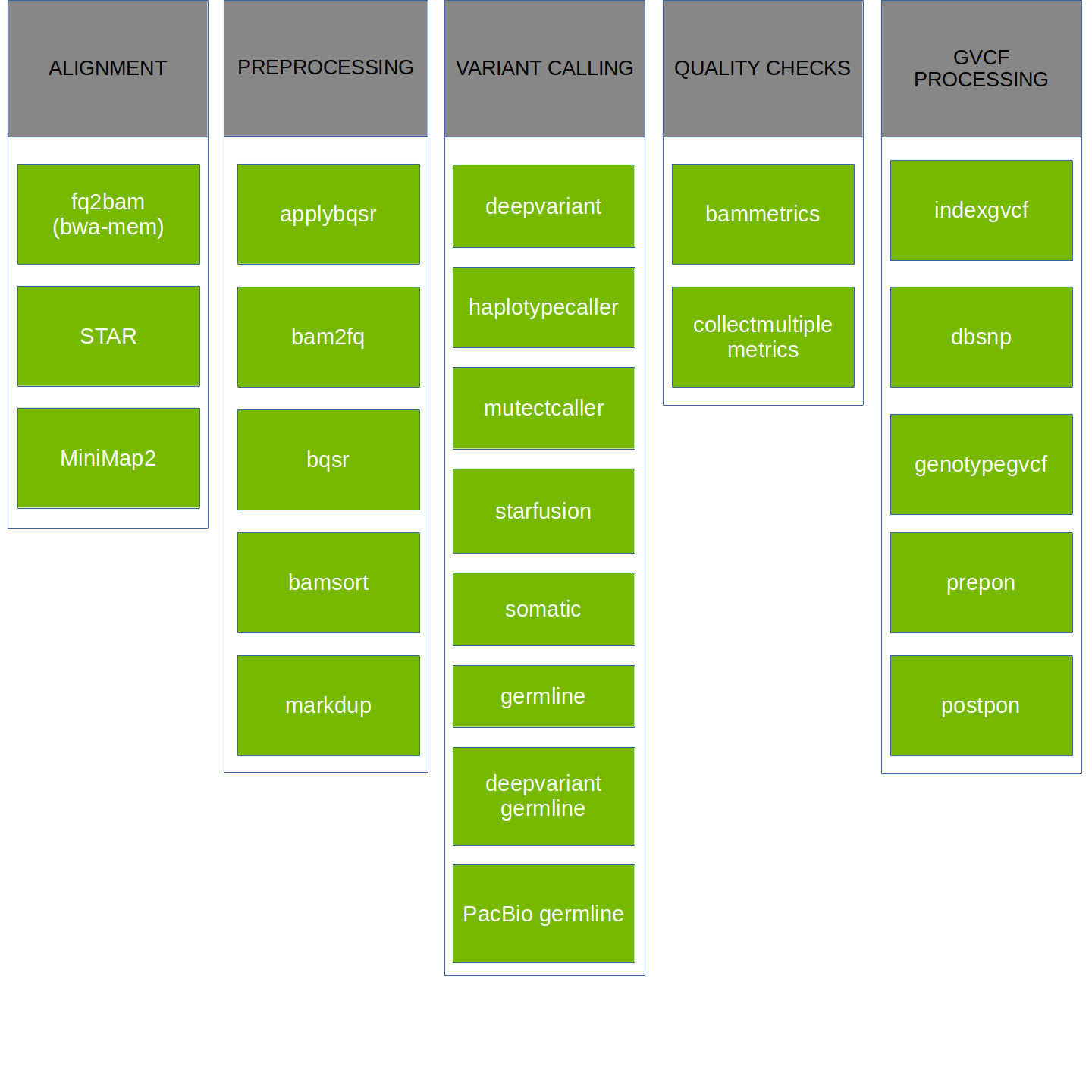- What's New?
- Getting Started with NVIDIA Parabricks
- Software Overview
- Best Performance
- Tutorials
- How-Tos
- Tool Reference
- Help
- References
How the Documentation is Organized
This page contains a brief overview of NVIDIA Parabricks: What it is, what it can do, and how to use it.
What's New? covers what's changed since the previous release: new tools, improvements to existing tools, and bug fixes.
Getting Started with NVIDIA Parabricks focuses on all the steps of setting up the software, including requirements, examples and optimizing it for performance
Software Overview is a more detailed discussion of the Parabricks tools, how to use Parabricks in a WDL or Nextflow environment, and its compatibility with comparable CPU versions of the software.
Best Performance gives tips on achieving optimal performance with the Parabricks software suite.
Tutorials walks you through a single use of Parabricks using an example dataset. The steps will familiarize the users with the software and walk you through a reproducible example. It will start from a reference and FASTQ files to a BAM file, then do variant calling on the BAM file, and produce a VCF file.
How-Tos explores larger, more involved tasks, examining a wider variety of options, tools, and workflows. Owing to the larger data sets in use, a more capable hardware platform may be required (more GPUs, more memory, etc).
Tool Reference contains reference documentation for each tool, organized both by category and alphabetically by tool name. It also tells users how to compare the output of Parabricks with the output from the baseline tools. A list of publications referencing Parabricks, a list of frequently asked questions, and pointers on getting more help and information are also part of this section
What is Parabricks?
Parabricks is a free software suite for performing secondary analysis of next generation sequencing (NGS) DNA and RNA data. It delivers results at blazing fast speeds and low cost. Parabricks can analyze 30x WGS (whole human genome) data in about 15 minutes, instead of 30 hours for other methods. Its output matches commonly used software, making it fairly simple to verify the accuracy of the output.
Why use Parabricks?
Under the hood, Parabricks achieves this performance through tight integration with GPUs, which excel at performing data-parallel computation much more effectively than traditional CPU-based solutions. Parabricks was built from the ground up by GPU computing and Deep Learning experts who wanted to develop the fastest and most efficient possible implementation of common genomics algorithms used in secondary analysis.
Learn more at the Parabricks developer page.
How can I get Parabricks?
Parabricks is freely available as a public container on NGC for use on-premises or any cloud service platforms and providers. You can learn more about Parabricks on our webpage, including how to purchase enterprise support for Parabricks through NVIDIA AI Enterprise with guaranteed response times, priority security notifications and access to AI experts from NVIDIA. Users on DGX Cloud are able to utilize NVIDIA AI Enterprise for free.
See the following Cloud Startup guides for more information on using Parabricks in the cloud:
Software Overview
Parabricks is a software suite for genomic analysis. It delivers major improvements in throughput time for common analytical tasks in genomics, including germline and somatic analysis. The core of the Parabricks software is its tight integration with the GPU, which takes raw data and transforms it according to the user's requirements.
Parabricks supports the tools shown below:

Parabricks has been tested on Dell, HPE, IBM, and NVIDIA servers at Amazon Web Services, Google Cloud, Oracle Cloud Infrastructure, and Microsoft Azure.
How to Get Help
For technical support, updated user guides, and other Clara Parabricks documentation, see the NVIDIA page.
Answers to most FAQs can be found on the developer forum.